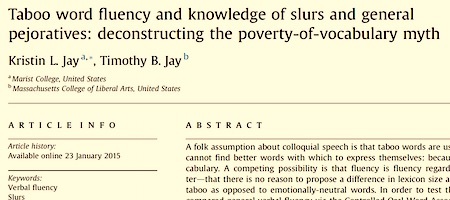Marc Abrahams's Blog, page 291
December 18, 2015
Rice-cravings increased by lack of rice (new study)
“Cravings for rice, a Japanese dietary staple, have been reported for Japanese people. Deprivation of a craved food is known to increase the desire for it, but the effects of deprivation of rice have yet to be explored.“
Until now, that is … for investigators Sakura Komatsu,Yasushi Kyutoku, Ippeita Danc, and Kenjiro Aoyama at Doshisha University and Chuo University, in Japan, have performed a set of experiments which:
“[…] provides the first experimental evidence that cravings for a staple food are enhanced by its deprivation.”
See: ‘Rice deprivation affects rice cravings in Japanese people’ in Food Quality and Preference, Volume 46, December 2015, Pages 9–16

December 17, 2015
Too tired to cheat?
 Have you ever been presented with an opportunity to cheat, but, paradoxically, just didn’t have the energy to bother? You may have been suffering from ‘Ego-Depletion’. According to professors Kai Chi (Sam) Yam, Xiao-Ping Chen, and Scott J. Reynolds, conducting investigations at the Management and Organization department at the Foster School of Business, University of Washington, US, paradoxical effects (such as ‘ego-depletion’) can sometimes leave people in a condition which might be described as ‘too tired to cheat’.
Have you ever been presented with an opportunity to cheat, but, paradoxically, just didn’t have the energy to bother? You may have been suffering from ‘Ego-Depletion’. According to professors Kai Chi (Sam) Yam, Xiao-Ping Chen, and Scott J. Reynolds, conducting investigations at the Management and Organization department at the Foster School of Business, University of Washington, US, paradoxical effects (such as ‘ego-depletion’) can sometimes leave people in a condition which might be described as ‘too tired to cheat’.
“[ego-] depleted participants are less likely to engage in unethical behavior of high social consensus as a result of increased subjective fatigue.”
See: ‘Ego depletion and its paradoxical effects on ethical decision making’ in: Decision Processes, Volume 124, Issue 2, July 2014,
Also see: The Influence of Time of Day on Unethical Behavior
Note: The illustration is taken from page 113 of ‘The Mysteries of the Court of London … With … illustrations’ courtesy the British Library
Also note: “Sleep-deprived people are more likely to cheat” writes Christopher M. Barnes, assistant professor of management at the University of Washington’s Foster School of Business, in this May 2013 article for Harvard Business Review.

December 16, 2015
Podcast #42: Dream telepathy and the Grateful Dead
Dream telepathy research with the Grateful Dead, people named Tainsch (and other things that vibrate), and a partially mummified corpse with pink teeth and pink nails — all of these turn up in this week’s Improbable Research podcast.
LISTEN TO IT! …or click on the “Venetian blinds” icon — at the lower right corner here — to select whichever week’s episode you want to hear:
SUBSCRIBE on Play.it, iTunes, or Spotify to get a new episode every week, free.
This week, Marc Abrahams tells about:
Dream telepathy and the Grateful Dead. (“An Experiment in Dream Telepathy with ‘The Grateful Dead’,” Stan Krippner, Monte Ullman and Bob Van de Castle, Journal of the American Society of Psychosomatic Dentistry and Medicine, vol. 20, no. 1, 1973, pp. 9-17. More details about that. Featuring dramatic readings by Melissa Franklin .)
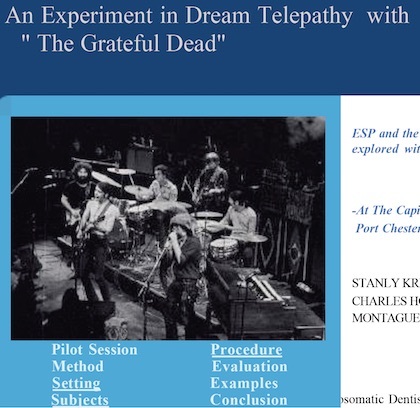
Oscillating this and that. (Tainsh, Michael A. (1972). ‘Oscillation of Human Performance as a Personality Measure.’ Perceptual and Motor Skills 35 (2): 677–78. /
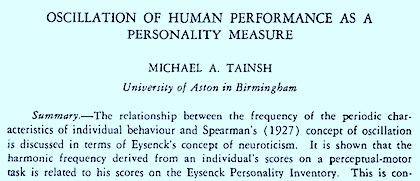 Tainsh, Michael A. and G. Winzar (1975). ‘The Influence of Travelling on Decision-Making.’ Ergonomics 18 (4): 427–34. / Tainsh, Michael A. (1977). ‘Influence of Travelling on Decision-Making.’ Perceptual and Motor Skills 44 (3): 1106. Spearman, Charles (1927). The Abilities of Man. London: Macmillan and Co. / Ryan, David Patrick, Susan M. M. Tainsh, Vita Kolodny, Bonnie L. Lendrum, and Rory H. Fisher (1988). ‘Noise-Making Amongst the Elderly in Long Term Care.’ Gerontologist 28 (3): 369–71. Featuring dramatic readings by Daniel Rosenberg.)
Tainsh, Michael A. and G. Winzar (1975). ‘The Influence of Travelling on Decision-Making.’ Ergonomics 18 (4): 427–34. / Tainsh, Michael A. (1977). ‘Influence of Travelling on Decision-Making.’ Perceptual and Motor Skills 44 (3): 1106. Spearman, Charles (1927). The Abilities of Man. London: Macmillan and Co. / Ryan, David Patrick, Susan M. M. Tainsh, Vita Kolodny, Bonnie L. Lendrum, and Rory H. Fisher (1988). ‘Noise-Making Amongst the Elderly in Long Term Care.’ Gerontologist 28 (3): 369–71. Featuring dramatic readings by Daniel Rosenberg.)
Icky Cutesy Research Review. (“Descartes and the Gut: ‘I’m Pink Therefore I Am,’“ D.G. Thompson, Gut, vol. 49, no. 2, August 2001, pp. 165-6. /
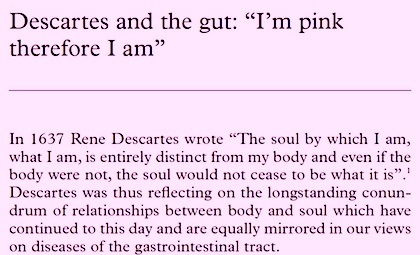 “Gastrointestinal: Intrathoracic Upside-Down Stomach,” Y. Fujiwara, K. Higuchi, and T. Arakawa, Journal of Gastroenterology and Hepatology, vol. 16, no. 7, July 2001, p. 823. / “Vomit Identification By a Pepsin Assay Using a Fibrin Blue-Agarose Gel Plate,” S. Yamada, et al., Forensic Science International, vol. 52, no. 2, January 1992, pp. 215-21. / “A Partially Mummified Corpse With Pink Teeth and Pink Nails,” C. Ortmann and A. DuChesne, International Journal of Legal Medicine, vol. 111, no. 1, 1998, pp. 35-7. Featuring dramatic readings by Jean Berko Gleason.)
“Gastrointestinal: Intrathoracic Upside-Down Stomach,” Y. Fujiwara, K. Higuchi, and T. Arakawa, Journal of Gastroenterology and Hepatology, vol. 16, no. 7, July 2001, p. 823. / “Vomit Identification By a Pepsin Assay Using a Fibrin Blue-Agarose Gel Plate,” S. Yamada, et al., Forensic Science International, vol. 52, no. 2, January 1992, pp. 215-21. / “A Partially Mummified Corpse With Pink Teeth and Pink Nails,” C. Ortmann and A. DuChesne, International Journal of Legal Medicine, vol. 111, no. 1, 1998, pp. 35-7. Featuring dramatic readings by Jean Berko Gleason.)
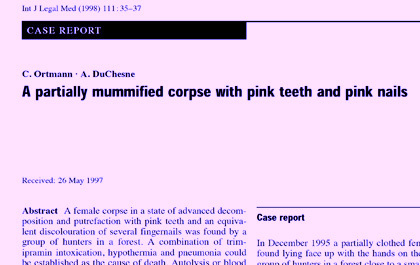
The mysterious John Schedler or the shadowy Bruce Petschek perhaps did the sound engineering this week.
The Improbable Research podcast is all about research that makes people LAUGH, then THINK — real research, about anything and everything, from everywhere —research that may be good or bad, important or trivial, valuable or worthless. CBS distributes it, on the CBS Play.it web site, and on iTunes and Spotify).

December 15, 2015
Yet another prize for Ig-winning ponytail-physics researcher
Congratulations to Ig Nobel Prize winner Ray Goldstein, who has now added another rare prize to his collection. Cambridge University press announces the latest triumph:
The G K Batchelor Prize for 2016 is awarded to Professor Raymond E. Goldstein FRS, Schlumberger Professor of Complex Physical Systems in the Department of Applied Mathematics and Theoretical Physics and Fellow of Churchill College, University of Cambridge.
The Prize was awarded after an international panel of experts considered nominations, over 150, received from researchers worldwide. This prestigious prize, sponsored by the Journal of Fluid Mechanics, is awarded every 4 years at the International Congress of Theoretical and Applied Mechanics to recognise the achievements of an active scientist who has made significant research contributions to fluid mechanics over the previous decade….
Professor Goldstein has served on various professional panels and committees as well as the editorial boards of several peer-reviewed journals. He is a Fellow of the Royal Society and American Physical Society, and has received several prizes in recognition of his work, including the 2012 Ig Nobel Prize.
The 2012 Ig Nobel Prize for physics was awarded to Joseph Keller, and Raymond Goldstein, Patrick Warren, and Robin Ball, for calculating the balance of forces that shape and move the hair in a human ponytail.
REFERENCE: “Shape of a Ponytail and the Statistical Physics of Hair Fiber Bundles,” Raymond E. Goldstein, Patrick B. Warren, and Robin C. Ball, Physical Review Letters, vol. 198, no. 7, 2012.
REFERENCE: “Ponytail Motion,” Joseph B. Keller, SIAM [Society for Industrial and Applied Mathematics] Journal of Applied Mathematics, vol. 70, no. 7, 2010, pp. 2667–72.

“Being fluent at swearing is a sign of healthy verbal ability”
Richard Stephens, who won an Ig Nobel Prize for his research on swearing, writes about a new discovery. His essay, in BPS Research Digest, has the headline “Being fluent at swearing is a sign of healthy verbal ability“. It says:
“there remains a very commonly held belief that swearing is a sign of inarticulateness and low IQ – something that the US-based psychologists Kristin and Timothy Jay set out to challenge in new research published in Language Sciences. At the heart of the “poverty of vocabulary” explanation for swearing is the assumption that people swear because they lack the intellectual capacity or motivation to bring to mind a more suitable expression. It’s the idea that people swear as a substitute for more reasoned and articulate speech. The Jays ran a simple yet ingenious study to test one specific aspect of this popular theory: are people who are more fluent in swear words less fluent in other forms of vocabulary?”
The new study is called “Taboo word fluency and knowledge of slurs and general pejoratives: deconstructing the poverty-of-vocabulary myth” [Language Sciences, vol. 52 2015, pp. 251–259].
Richard Stephens is one of the psychologists acknowledged in the text as having advised the authors. The 2010 Ig Nobel Prize for psychology was awarded to Richard Stephens, John Atkins, and Andrew Kingston of Keele University, for confirming the widely held belief that swearing relieves pain. That research is documented in the study “Swearing as a Response to Pain,” published in the journal Neuroreport [vol. 20 , no. 12, 2009, pp. 1056-60].
BONUS: One of the monographs Richard Stephens mentions in his essay is McEnerny and Xiao’s beloved “Swearing in Modern British English: The Case of Fuck in the BNC”

December 14, 2015
Does Science Really Advance One Funeral at a Time?
A new study claims to answer an old question. The study’s answer is: probably. The study, done by three young economists, is:
“Does Science Advance One Funeral at a Time?” Pierre Azoulay [pictured here], Christian Fons-Rosen, Joshua S. Graff Zivin, NBER Working Paper No. 21788, December 2015. The authors, at MIT, the Universitat Pompeu Fabra, and the University of California San Francisco, explain:
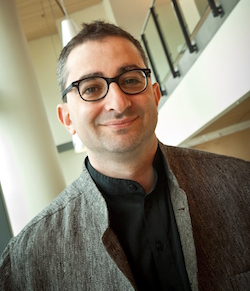 “We study the extent to which eminent scientists shape the vitality of their fields by examining entry rates into the fields of 452 academic life scientists who pass away while at the peak of their scientific abilities. Key to our analyses is a novel way to delineate boundaries around scientific fields by appealing solely to intellectual linkages between scientists and their publications, rather than collaboration or co-citation patterns. Consistent with previous research, the flow of articles by collaborators into affected fields decreases precipitously after the death of a star scientist (relative to control fields). In contrast, we find that the flow of articles by non-collaborators increases by 8% on average. These additional contributions are disproportionately likely to be highly cited. They are also more likely to be authored by scientists who were not previously active in the deceased superstar’s field. Overall, these results suggest that outsiders are reluctant to challenge leadership within a field when the star is alive and that a number of barriers may constrain entry even after she is gone. Intellectual, social, and resource barriers all impede entry, with outsiders only entering subfields that offer a less hostile landscape for the support and acceptance of ‘foreign’ ideas.”
“We study the extent to which eminent scientists shape the vitality of their fields by examining entry rates into the fields of 452 academic life scientists who pass away while at the peak of their scientific abilities. Key to our analyses is a novel way to delineate boundaries around scientific fields by appealing solely to intellectual linkages between scientists and their publications, rather than collaboration or co-citation patterns. Consistent with previous research, the flow of articles by collaborators into affected fields decreases precipitously after the death of a star scientist (relative to control fields). In contrast, we find that the flow of articles by non-collaborators increases by 8% on average. These additional contributions are disproportionately likely to be highly cited. They are also more likely to be authored by scientists who were not previously active in the deceased superstar’s field. Overall, these results suggest that outsiders are reluctant to challenge leadership within a field when the star is alive and that a number of barriers may constrain entry even after she is gone. Intellectual, social, and resource barriers all impede entry, with outsiders only entering subfields that offer a less hostile landscape for the support and acceptance of ‘foreign’ ideas.”
(Thanks to John Fleck for bringing this to our attention.)

The Smell of Jazz
 Would you say that Jazz music tends to go with the smell of coffee? How about Blues with leather, or Bach with peppermint? Rather than, say, fish*? If so, you’re very much attuned with the findings of a new study published in CogSci 2015 Proceedings, entitled ‘The Smell of Jazz: Crossmodal Correspondences Between Music, Odor, and Emotion’
Would you say that Jazz music tends to go with the smell of coffee? How about Blues with leather, or Bach with peppermint? Rather than, say, fish*? If so, you’re very much attuned with the findings of a new study published in CogSci 2015 Proceedings, entitled ‘The Smell of Jazz: Crossmodal Correspondences Between Music, Odor, and Emotion’
“The present study investigates the emotion mediation hypothesis for correspondences between odor and music, testing whether the strength of odor-music matches for particular odors and musical selections can be predicted by the similarity of the emotional associations with the odors and music. We found that perceived matches were higher when the emotional responses were similar and that a model including emotional dimensions captured a significant amount of the variance of match scores . These results provide new evidence that crossmodal correspondences are mediated by emotions.”
*Note: Fishy was comprehensively unpopular, except with the category Heavy Metal, where it was first on the list.
Also see: Tastes like Trombones
Illustration: Albert Gleizes, 1915, Composition pour Jazz, oil on cardboard, Solomon R. Guggenheim Museum, New York.

December 13, 2015
Inventions to Match Up Matching Socks
The problem of mismatched and missing socks has spurred inventors to invent a better way to keep matching socks matched together. The article “Inventions to Match Up Matching Socks” gives a history of some of the most spectacular efforts — as revealed in patents and scientific studies.
The article is one of the highlights of the special “Clever Inventions” issue of the Annals of Improbable Research.
We urge you, for the sake of your socks and your sanity, to subscribe to the Annals of Improbable Research! The magazine is now in handy (or, if you care about socks so very much, foot-y) PDF form.

Totting up the deaths by this and that in Shakespeare’s plays
This pie chart shows the relative numbers of deaths — due to different causes — that happen on stage in William Shakespeare’s plays. In this tallying, death by being-baked-into-pie is as frequent as death-by-hanging. (The pie death occurs in Titus Andronicus.)
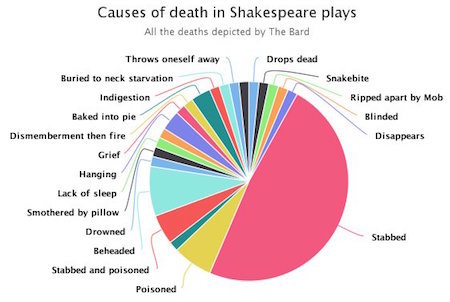
The chart was, reportedly, assembled in connection with a new play in which all those deaths — 74 in total — are re-enacted in a single play written by persons other than Shakespeare. The play, called “The Complete Deaths“, produced by the British company Spymonkey, is scheduled to premiere in May 2016. (Thanks to Alice Dreger and Deborah Blum for bringing this to our attention.) One critic professes to be full of huff about this.
Others have attempted to compile and to some extent analyze some of the death-by-Shakespeare data. One effort is documented in this medical study:
“Faints, fits, and fatalities from emotion in Shakespeare’s characters: survey of the canon,” Kenneth W. Heaton, British Medical Journal, 333(7582), December 26, 2015, pp. 1335–1338.

December 12, 2015
The disgusting (to some people) secrets of smelly (to most people) feet
The smelly feet / Limburger cheese / malaria mosquito research that earned an Ig Nobel Prize (in 2006) has provoked a deeper look at smelly foot smells. David Robson reports, for BBC Future:
The disgusting secrets of smelly feet
Renate Smallegange is something of a connoisseur of smelly feet – and she goes to surprising lengths to study their odours. Sometimes she’ll collect worn nylon socks that have become imbued with the fragrance. If that’s not good enough, she asks people to rub their feet on glass beads and wipe their sweaty skin on the surface. When she’s being really picky, she’ll trap the feet in a plastic bag, allowing her to draw up the aroma in gusts of air. Of all the jobs in the world, it’s certainly not the most pleasant, but Smallegange is mostly unperturbed by the occasional whiff of cheese. “It’s not a big deal,” she tells me. “Of course some people do smell nicer than others – from my personal point of view.” …
In some situations, foot odour is much more serious than slight embarrassment, however – it might be a matter of life or death. Dutch scientist Bart Knols was one of the first to notice that certain species of malaria-carrying mosquitoes are attracted to the smells wafting from our feet. His work has since inspired many of Smallegange’s latest studies at Wageningen University in the Netherlands….
Here’s an interview in 2010, with Lisa Mullins on The World, in which Renate Smallegange discusses how “socks may keep mosquitoes at bay“.
Here’s video of Bart Knols explaining and demonstrating the basics of smelly foot research:
As with many things, Bill Gates is peripherally involved in the smelly foot research efforts, says a report headlined “Bill and Melinda Gates to fight malaria in Africa using smelly socks.”

Marc Abrahams's Blog
- Marc Abrahams's profile
- 14 followers


